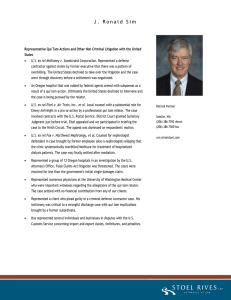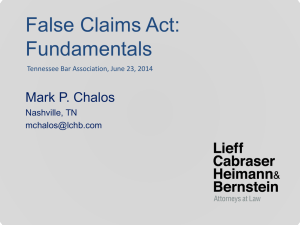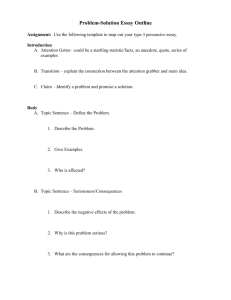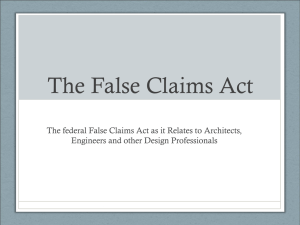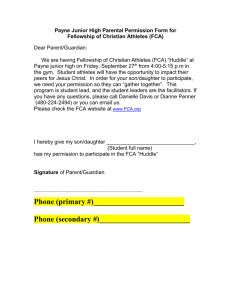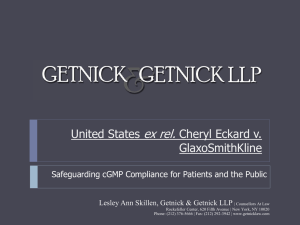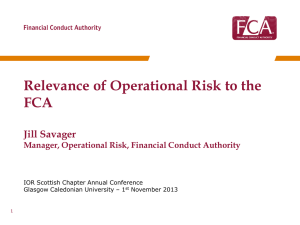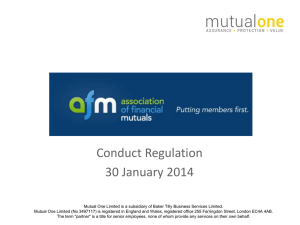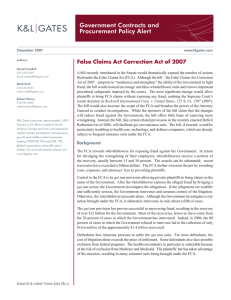Hughes Hubbard & Reed LLP
advertisement
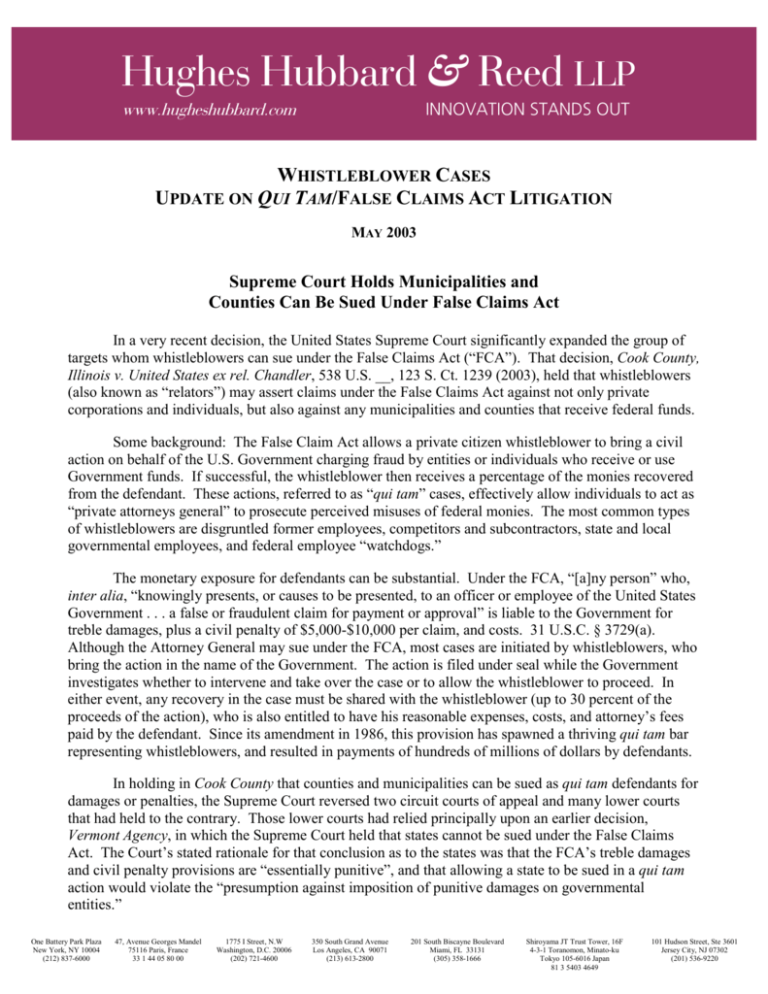
Hughes Hubbard & Reed LLP www.hugheshubbard.com INNOVATION STANDS OUT WHISTLEBLOWER CASES UPDATE ON QUI TAM/FALSE CLAIMS ACT LITIGATION MAY 2003 Supreme Court Holds Municipalities and Counties Can Be Sued Under False Claims Act In a very recent decision, the United States Supreme Court significantly expanded the group of targets whom whistleblowers can sue under the False Claims Act (“FCA”). That decision, Cook County, Illinois v. United States ex rel. Chandler, 538 U.S. __, 123 S. Ct. 1239 (2003), held that whistleblowers (also known as “relators”) may assert claims under the False Claims Act against not only private corporations and individuals, but also against any municipalities and counties that receive federal funds. Some background: The False Claim Act allows a private citizen whistleblower to bring a civil action on behalf of the U.S. Government charging fraud by entities or individuals who receive or use Government funds. If successful, the whistleblower then receives a percentage of the monies recovered from the defendant. These actions, referred to as “qui tam” cases, effectively allow individuals to act as “private attorneys general” to prosecute perceived misuses of federal monies. The most common types of whistleblowers are disgruntled former employees, competitors and subcontractors, state and local governmental employees, and federal employee “watchdogs.” The monetary exposure for defendants can be substantial. Under the FCA, “[a]ny person” who, inter alia, “knowingly presents, or causes to be presented, to an officer or employee of the United States Government . . . a false or fraudulent claim for payment or approval” is liable to the Government for treble damages, plus a civil penalty of $5,000-$10,000 per claim, and costs. 31 U.S.C. § 3729(a). Although the Attorney General may sue under the FCA, most cases are initiated by whistleblowers, who bring the action in the name of the Government. The action is filed under seal while the Government investigates whether to intervene and take over the case or to allow the whistleblower to proceed. In either event, any recovery in the case must be shared with the whistleblower (up to 30 percent of the proceeds of the action), who is also entitled to have his reasonable expenses, costs, and attorney’s fees paid by the defendant. Since its amendment in 1986, this provision has spawned a thriving qui tam bar representing whistleblowers, and resulted in payments of hundreds of millions of dollars by defendants. In holding in Cook County that counties and municipalities can be sued as qui tam defendants for damages or penalties, the Supreme Court reversed two circuit courts of appeal and many lower courts that had held to the contrary. Those lower courts had relied principally upon an earlier decision, Vermont Agency, in which the Supreme Court held that states cannot be sued under the False Claims Act. The Court’s stated rationale for that conclusion as to the states was that the FCA’s treble damages and civil penalty provisions are “essentially punitive”, and that allowing a state to be sued in a qui tam action would violate the “presumption against imposition of punitive damages on governmental entities.” One Battery Park Plaza New York, NY 10004 (212) 837-6000 47, Avenue Georges Mandel 75116 Paris, France 33 1 44 05 80 00 1775 I Street, N.W Washington, D.C. 20006 (202) 721-4600 350 South Grand Avenue Los Angeles, CA 90071 (213) 613-2800 201 South Biscayne Boulevard Miami, FL 33131 (305) 358-1666 Shiroyama JT Trust Tower, 16F 4-3-1 Toranomon, Minato-ku Tokyo 105-6016 Japan 81 3 5403 4649 101 Hudson Street, Ste 3601 Jersey City, NJ 07302 (201) 536-9220 Page 2 Cook County involved a federal grant to the Cook County Hospital and an affiliated nonprofit research institute for a drug abuse study. Like many other qui tam actions, it began with the firing of an employee, in this case, the head of the institute, Janet Chandler. Chandler filed a qui tam action claiming that the County and the Institute had submitted false statements to obtain the federal grant funds. The district court dismissed the action, holding that the County, like a State, could not be subjected to “essentially punitive” treble damages. The Court of Appeals for the Seventh Circuit reversed, and the County filed a petition for certiorari. The Supreme Court unanimously upheld the Seventh Circuit, finding no support in the FCA itself or its history to support the conclusion that municipalities and counties were excluded from the class of persons who could be sued under the Act. The Court found no merit in the County’s argument that the punitive nature of FCA liability warranted the inference that the FCA was not intended to apply to municipalities. While acknowledging its prior holding in Vermont Agency, the Court emphasized the compensatory aspects of treble damages, noting that: a substantial portion of the treble damages would be awarded to the whistleblower; that no prejudgment interest or consequential damages were available; and that unlike classic punitive damages, the jury’s discretion was not unbounded. The Court found there is a tradeoff, between local taxpayers, who had presumably received the benefits of the County’s false claims, versus federal taxpayers, who would have to bear the loss if no FCA recovery were available. The Court concluded that “the term ‘person’ in § 3729 included local governments in 1863 [when the original FCA was enacted] and nothing in the 1986 amendments redefined it.” The Cook County decision rings alarm bells for local government entities and the private entities that assist them in administering federally funded programs. Some of the more common defendants in qui tam actions are government contractors and subcontractors, colleges and universities, medical care providers (including hospitals, doctors and clinics), and federal grantees. Qui tam claims, whether wellfounded or not, can enmesh defendants in civil, administrative and even criminal investigations, sometimes simultaneously. The complications posed by the Act’s sealing requirements and unique procedural rules add to the threat posed by the whistleblower, who himself enjoys specific protection under the FCA from retaliation. Cook County paves the way for a new group of “watchdogs” at the local level. ________________________________________________________________ This Advisory is for information purposes only and is not intended as legal advice. For more information on the False Claims Act and qui tam actions, please contact: Susan M. Campbell Robert B. Funkhouser (212) 837-6070 (202) 721-4780 campbels@hugheshubbard.com funkhous@hugheshubbard.com
